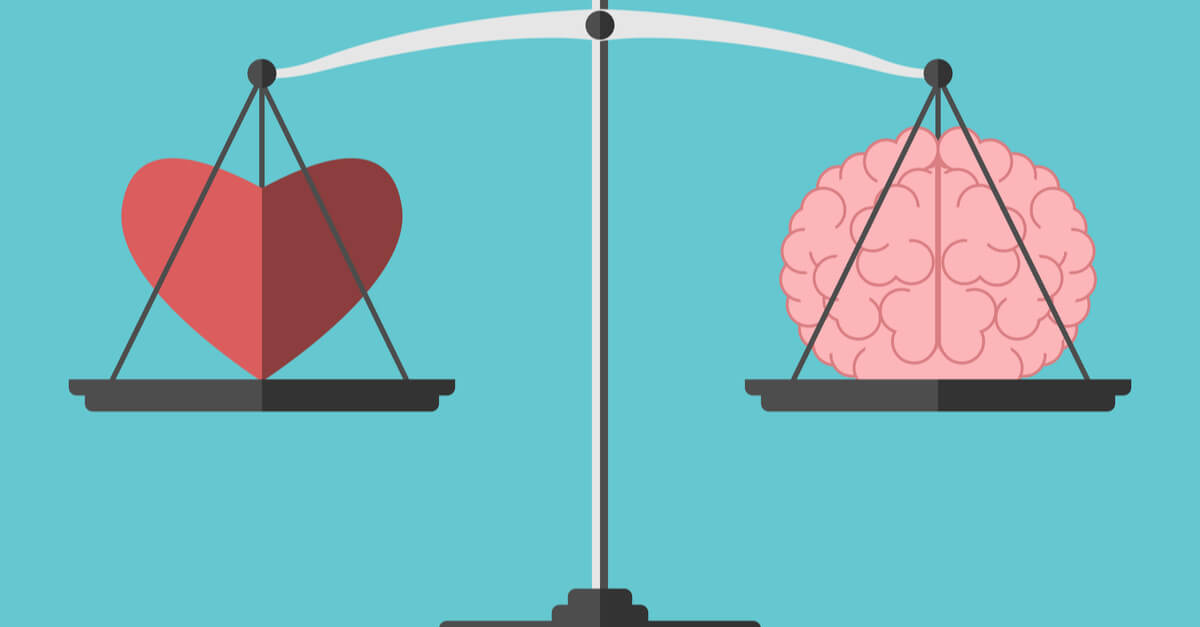Literature and other arts have cultivated in us the belief that the best decisions are made from reason, rejecting decisions made by the heart as unreasonable. However, making decisions with complete freedom of emotions is not always effective. Making decisions only with the heart, forgetting the reason, is not a guarantee of good results either. So what is the solution? A balance between reason and emotion is the answer.
Finding a smart balance between the rational and the emotional with this in mind is the key to increasing your success rate when making decisions. At the same time, this balance is the result of life experience and, therefore, of many mistakes made over time.
- So maybe the first smart decision we can make is to stop creating a conflict between reason and emotion.
- If we think about it.
- In most cases they both tend to point us towards the same option.
- However.
- Unfortunately.
- Separating reason and emotion is very common for many people.
We all want to make the right decisions, at least the right ones, but what is the right decision? Is this question difficult to answer? Some say that the correct decision is the one that brings us the most benefit, but it is not always clear, otherwise everyone would choose the decision that brings us the most benefit regardless of the other consequences.
For example, when we fall in love, emotions gain strength and tend to reign in our minds, and therefore govern our decisions. During the passion phase we have become blind to some extent, and even deaf. Now looking from the outside? Is it the most advantageous for us?
Emotions, not just falling in love, have always influenced our decisions. Its importance has been particularly demonstrated and has become even more important in the face of some research on brain damage to the orbitofrontal cortex, partly responsible for emotional processing and with a role in decision-making.
This region influences the functioning of the amygdala, another part of the brain that is also involved in our emotional system. In this way, patients with lesions in the orbitofrontal cortex end up not taking or with less consideration of emotions when making a decision.
What would we think of a person who makes purely rational decisions? Knowing that a person only cares about the benefits for himself, we would be a little suspicious. She would not be a good person to trust. We hope, at the same time, that people are rational so that we can trust them.
Or not?
Here is a paradox
It is true that empathy, the ability to perceive the emotions of others, is what makes us trust others. More than rationality itself. We depend more on those people who are able to smile or be moved by our pain.
It is easier to see in teenagers. At this age they often make decisions that involve great risk. For this reason, adolescence is generally considered a very difficult time, in which young people do not pay much attention to the concerns of their parents. The cause, or at least one of the causes, can be found precisely in the prefrontal cortex of the brain.
It is in this part of the brain that the orbitofrontal cortex is located, which is not yet fully developed at this age. Because it is not fully developed, the control of emotions is much less effective and, therefore, the influence of emotions on decision making is enormous. Fortunately, experiences at this stage in life often cause this part of the brain to mature.
So far, it seems that we are in a great contradiction. We have said that the best time to make decisions is to mix reason and emotion, but so far we have only talked about the negative influence of emotions when deciding. To understand the role of emotions as a whole, it is necessary to understand what somatic markers are.
Somatic markers are feelings that guide you when making decisions. These markers help us decide which option will be the best based on our interests, especially when reason brings so many elements that we are not able to unravel to find a clear option.
Somatic markers can also be perceived as hunches generated from past experiences, which are not necessarily conscious at the time. Intuition warns us of the consequences of choosing certain paths over others.
For example, if we pass a street where at some point in our lives we have been robbed, we will feel that it is better to go to another street. We do not need to remind ourselves that we were consciously assaulted at that time to experience this feeling, so intuitions are not always conscious. So we can change streets all of a sudden, not knowing exactly why we did it if we’re asked to.
Emotions sometimes act as an alarm about options that do not suit us, however, these warnings are not always reliable. We may be alerted to unrealistic dangers, such as phobias.
Fortunately, with this intuition we also have rational processes, these allow us to weigh the pros and cons, this duality between reason and emotion is the one that guides our decision-making, which allows us to continue and maintain hope. , often dysfunctional, decide for us, but at the same time be attentive to their warnings, it is the result of the balance between reason and emotion and the ideal that we must pursue.

